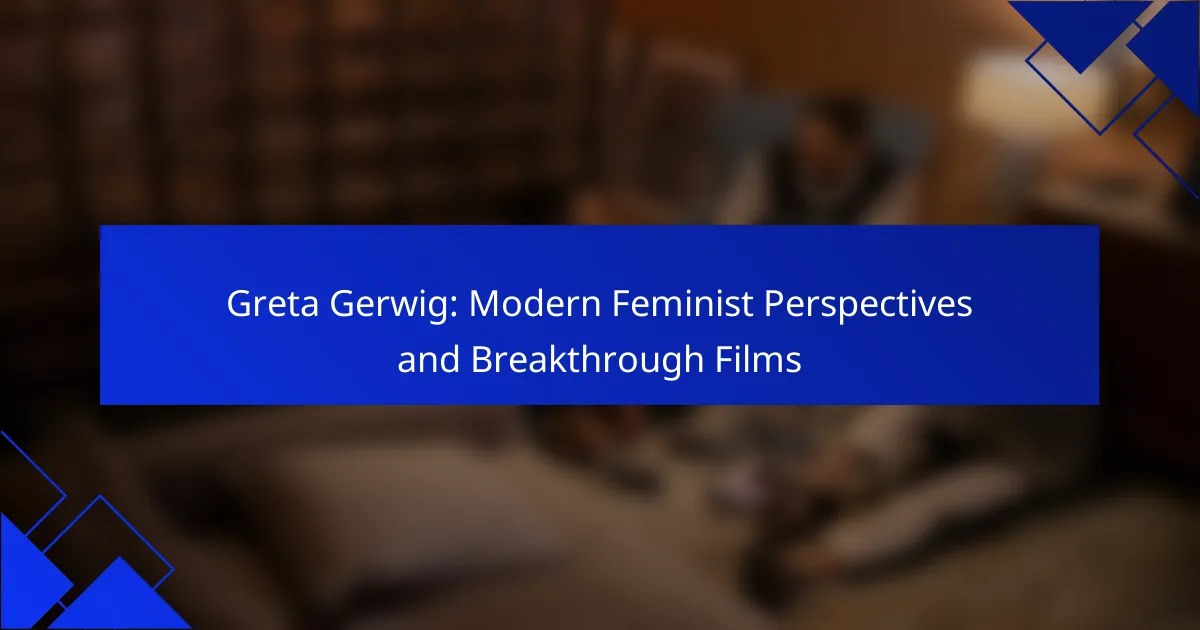
What defines Greta Gerwig’s role in modern feminism?
Greta Gerwig’s role in modern feminism is defined by her innovative storytelling and representation of female experiences. She challenges traditional gender roles through her films. Gerwig’s works often highlight women’s autonomy and complex relationships. Her film “Lady Bird” received critical acclaim for its authentic portrayal of a young woman’s journey. In “Little Women,” she reinterprets a classic narrative to emphasize female empowerment. Gerwig’s characters often reflect diverse backgrounds and perspectives. She advocates for women’s voices in the film industry. Her success as a director and writer inspires future generations of female filmmakers.
How has Greta Gerwig’s background influenced her feminist perspectives?
Greta Gerwig’s background has significantly shaped her feminist perspectives. Growing up in Sacramento, California, she experienced a diverse cultural environment. Her education in theater and literature at Barnard College exposed her to feminist literature and critical theory. Gerwig’s early career in independent film highlighted women’s stories and perspectives. Collaborating with female filmmakers reinforced her commitment to gender equality in the industry. Her films often feature complex female characters navigating societal expectations. Gerwig’s personal experiences and education inform her narratives, making them resonate with contemporary feminist themes.
What personal experiences shaped her views on gender equality?
Greta Gerwig’s views on gender equality were shaped by her experiences growing up in a household that valued strong female figures. Her mother was a teacher and her father worked in construction, which exposed her to diverse gender roles. Gerwig faced challenges in a male-dominated film industry. These experiences helped her recognize the importance of representation and women’s voices in storytelling. She has spoken about the need for authentic female characters. Gerwig’s films often feature complex female protagonists, reflecting her commitment to gender equality. Her work aims to challenge stereotypes and promote equal opportunities for women in film.
How do her educational and professional journeys reflect her feminist ideology?
Greta Gerwig’s educational and professional journeys reflect her feminist ideology through her focus on female narratives. She studied at Barnard College, where she engaged with feminist literature and theory. This academic background influenced her later works, which often center on women’s experiences. Gerwig’s films, like “Lady Bird” and “Little Women,” highlight complex female characters and their struggles. She emphasizes themes of autonomy and self-discovery in her storytelling. Her directorial choices challenge traditional gender roles in cinema. By prioritizing women’s voices, she advocates for representation in the film industry. Gerwig’s success as a female director also serves as an inspiration for aspiring women filmmakers.
What themes are prevalent in Greta Gerwig’s films?
Greta Gerwig’s films often explore themes of female empowerment and identity. Her narratives frequently center on the complexities of womanhood. Gerwig’s characters navigate personal growth and societal expectations. She emphasizes the importance of friendship and relationships among women. Themes of adolescence and the transition to adulthood are also prominent. Her works reflect a modern feminist perspective, challenging traditional gender roles. Additionally, Gerwig addresses issues of family dynamics and personal choice. These themes resonate with audiences, contributing to her films’ critical acclaim.
How do her films challenge traditional gender roles?
Her films challenge traditional gender roles by presenting complex female characters who defy stereotypes. In “Lady Bird,” the protagonist seeks independence and self-identity against societal expectations. “Little Women” showcases diverse ambitions among sisters, highlighting their individual aspirations over traditional roles. Gerwig’s narratives often prioritize women’s voices and experiences, offering a counter-narrative to male-dominated storytelling. This approach emphasizes female agency and empowerment. Gerwig’s work has been recognized for its cultural impact, receiving critical acclaim for redefining femininity in contemporary cinema.
What messages about female empowerment are conveyed in her storytelling?
Her storytelling conveys messages of resilience and independence for women. Gerwig’s narratives often showcase female characters overcoming societal expectations. These characters are portrayed as complex individuals with their own aspirations. The stories emphasize the importance of female friendships and support systems. Gerwig highlights the struggle for self-identity amidst external pressures. Her films challenge traditional gender roles and stereotypes. They promote the idea that women can define their own paths. This approach resonates with contemporary feminist ideals and inspires audiences.

What are the breakthrough films directed by Greta Gerwig?
Greta Gerwig’s breakthrough films are “Lady Bird” and “Little Women.” “Lady Bird,” released in 2017, received critical acclaim and five Academy Award nominations. It was Gerwig’s directorial debut and showcased her unique storytelling style. “Little Women,” released in 2019, is an adaptation of the classic novel. This film also received multiple nominations, including Best Picture. Both films highlight Gerwig’s ability to portray complex female characters and modern feminist themes.
How did “Lady Bird” contribute to her recognition as a filmmaker?
“Lady Bird” significantly contributed to Greta Gerwig’s recognition as a filmmaker. The film was both a critical and commercial success. It received five Academy Award nominations, including Best Picture and Best Director. Gerwig became the fifth woman nominated for Best Director in Oscar history. The film’s authentic portrayal of adolescence resonated with audiences. It showcased her unique voice and storytelling ability. “Lady Bird” solidified her status in the film industry. Critics praised Gerwig for her fresh perspective on female coming-of-age stories. This recognition opened doors for her future projects.
What unique qualities make “Lady Bird” a significant feminist film?
“Lady Bird” is significant as a feminist film due to its authentic portrayal of female adolescence. The film centers on a young woman’s journey toward self-discovery and independence. It highlights the complexities of mother-daughter relationships. The narrative emphasizes personal agency and the struggle for identity. It presents a diverse range of female experiences and aspirations. The film challenges traditional gender roles and societal expectations. It showcases women’s friendships as a source of strength and support. “Lady Bird” received critical acclaim for its relatable characters and feminist themes, further solidifying its importance in contemporary cinema.
How was the film received by critics and audiences alike?
The film received positive reviews from both critics and audiences. Critics praised its innovative storytelling and strong performances. The film achieved a high rating on Rotten Tomatoes, indicating widespread acclaim. Audience reactions were similarly enthusiastic, reflected in strong box office numbers. Many viewers highlighted its relatable themes and engaging characters. Overall, the film resonated well with its target demographic, contributing to its success.
What impact did “Little Women” have on modern cinema?
“Little Women” significantly impacted modern cinema by redefining female narratives and representation. The film, directed by Greta Gerwig, showcases complex female characters with distinct ambitions and challenges. It emphasizes themes of sisterhood, independence, and personal growth. This portrayal resonates with contemporary audiences seeking authentic and diverse stories. Gerwig’s adaptation received critical acclaim, earning six Academy Award nominations. This recognition highlights the film’s contribution to the discourse on women’s roles in storytelling. Additionally, “Little Women” inspired a wave of female-led projects in Hollywood, encouraging more women to take on directing and writing roles. The film’s success demonstrates the market viability of female-centric narratives, influencing future productions.
In what ways does “Little Women” reinterpret a classic narrative?
“Little Women” reinterprets a classic narrative by emphasizing female agency and diverse aspirations. The film presents the March sisters as complex individuals with unique dreams. It challenges traditional gender roles by showcasing their ambitions beyond marriage. Greta Gerwig’s adaptation highlights the importance of sisterhood and personal growth. The narrative structure intertwines past and present, reflecting modern feminist values. It also critiques societal expectations placed on women. This reinterpretation resonates with contemporary audiences, making the classic story relevant today. The film’s success showcases its impact on feminist discourse in cinema.
How does the film address contemporary feminist issues?
The film addresses contemporary feminist issues by showcasing strong female characters who challenge societal norms. It emphasizes themes of empowerment, autonomy, and identity. The narrative explores the struggles women face in a patriarchal society. It highlights the importance of female friendships and solidarity. The film also critiques traditional gender roles and stereotypes. Through its characters’ journeys, it promotes self-discovery and agency. This approach resonates with current feminist movements advocating for equality and representation. Overall, the film serves as a reflection of ongoing feminist dialogues in society.

What are the critical receptions of Greta Gerwig’s work?
Greta Gerwig’s work has received widespread critical acclaim. Her films often explore themes of femininity and identity. “Lady Bird” holds a 99% approval rating on Rotten Tomatoes. Critics praised its authentic portrayal of adolescence. “Little Women” also received positive reviews, scoring 95% on Rotten Tomatoes. Reviewers highlighted its fresh take on a classic story. Gerwig’s direction is noted for its emotional depth and character development. Many critics recognize her as a significant voice in contemporary cinema. Her work has earned multiple award nominations, including Academy Awards.
How have critics responded to her films from a feminist perspective?
Critics have generally responded positively to Greta Gerwig’s films from a feminist perspective. Her work often features strong female characters and explores themes of identity and autonomy. Many critics highlight her ability to depict women’s experiences authentically. For instance, “Lady Bird” showcases a young woman’s journey towards self-discovery. Critics have praised its nuanced portrayal of mother-daughter relationships. Additionally, “Little Women” received acclaim for its modern adaptation of a classic feminist text. Reviewers noted Gerwig’s emphasis on female agency within the narrative. Overall, her films are seen as significant contributions to contemporary feminist cinema.
What accolades has Greta Gerwig received for her contributions to cinema?
Greta Gerwig has received multiple accolades for her contributions to cinema. She was nominated for two Academy Awards for Best Director and Best Adapted Screenplay for “Little Women” in 2020. Gerwig won the Best Director award at the 2020 Golden Globe Awards for “Little Women.” She also received the Critics’ Choice Award for Best Adapted Screenplay for the same film. In addition, Gerwig was honored with the Best Director award at the 2020 National Board of Review. Her work has been recognized for its innovative storytelling and strong female perspectives.
How do audiences perceive her films in relation to feminist themes?
Audiences perceive Greta Gerwig’s films as significant contributions to feminist themes. Her films often explore women’s experiences and identities. Many viewers appreciate her nuanced portrayal of female characters. Critics note her ability to tackle complex societal issues through a feminist lens. For example, “Lady Bird” highlights the struggles of adolescence and mother-daughter relationships. “Little Women” emphasizes women’s autonomy and ambition. Audience reactions often celebrate her storytelling as empowering. Gerwig’s films resonate with those seeking authentic representations of women. Overall, her work is viewed as a vital part of contemporary feminist cinema.
What can aspiring filmmakers learn from Greta Gerwig’s approach?
Aspiring filmmakers can learn the importance of authentic storytelling from Greta Gerwig’s approach. Gerwig emphasizes personal experiences as a foundation for her narratives. Her films often reflect her own life and perspectives, making them relatable. She also showcases strong, complex female characters, which resonates with audiences. Gerwig’s attention to detail in character development enhances emotional engagement. Additionally, she advocates for collaboration within her creative teams. This approach fosters diverse ideas and perspectives in filmmaking. Gerwig’s success with films like “Lady Bird” and “Little Women” demonstrates the effectiveness of her methods. These films received critical acclaim and box office success, reinforcing her impact in the industry.
How can her storytelling techniques inspire new narratives in film?
Greta Gerwig’s storytelling techniques can inspire new narratives in film by emphasizing authentic character development and complex female perspectives. Her films often showcase multidimensional female characters who defy traditional stereotypes. For instance, in “Lady Bird,” Gerwig explores the nuanced relationship between a mother and daughter, highlighting their individual struggles and growth. This approach encourages filmmakers to prioritize character depth over archetypes. Additionally, Gerwig’s use of humor and realism invites audiences to connect emotionally with the narrative. This blend of relatability and wit can reshape how stories are told, making them more inclusive and reflective of diverse experiences. Her success demonstrates that innovative storytelling can resonate widely, influencing future filmmakers to adopt similar techniques.
What best practices can be adopted from her filmmaking style?
Greta Gerwig’s filmmaking style emphasizes character-driven narratives. She prioritizes authentic representation of women’s experiences. Gerwig often incorporates humor to address serious themes. Her use of vibrant visuals enhances emotional engagement. She values collaboration with actors to foster genuine performances. Gerwig’s scripts often feature relatable dialogue that resonates with audiences. Her approach to storytelling includes non-linear narratives that challenge conventions. These practices contribute to her unique voice in contemporary cinema.
Greta Gerwig is a prominent figure in modern feminism, recognized for her innovative storytelling and representation of female experiences in film. The article explores Gerwig’s background, personal experiences, and educational journey that shape her feminist perspectives. It highlights her breakthrough films, “Lady Bird” and “Little Women,” emphasizing themes of female empowerment, identity, and the challenge of traditional gender roles. Additionally, the article discusses critical receptions of her work, audience perceptions regarding feminist themes, and best practices that aspiring filmmakers can adopt from her filmmaking style.
